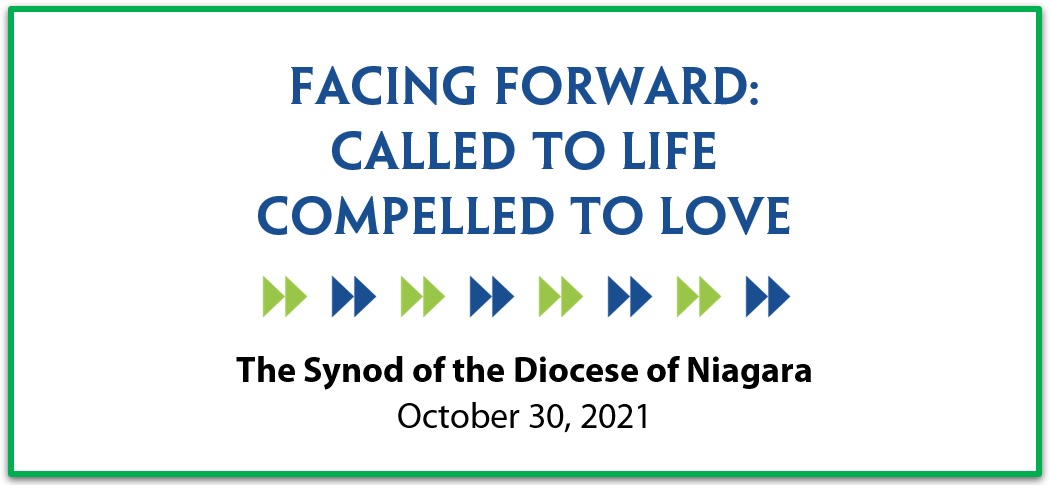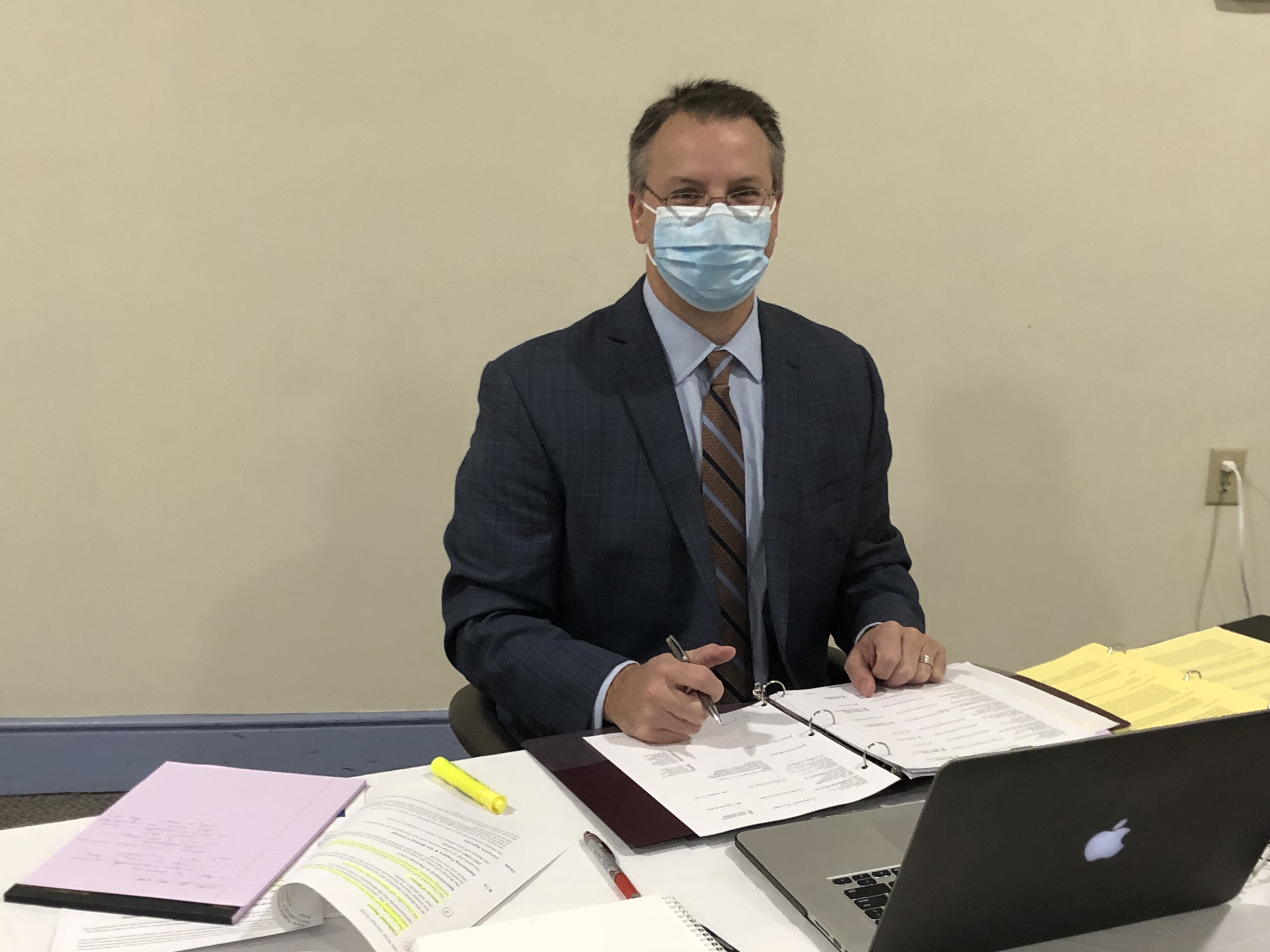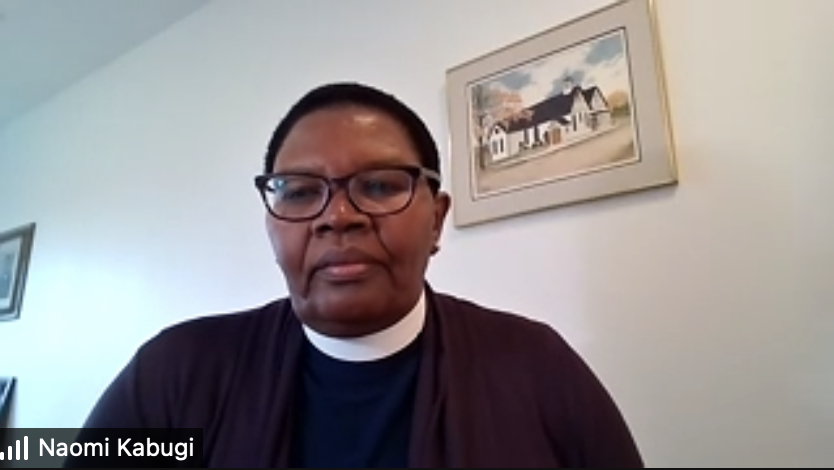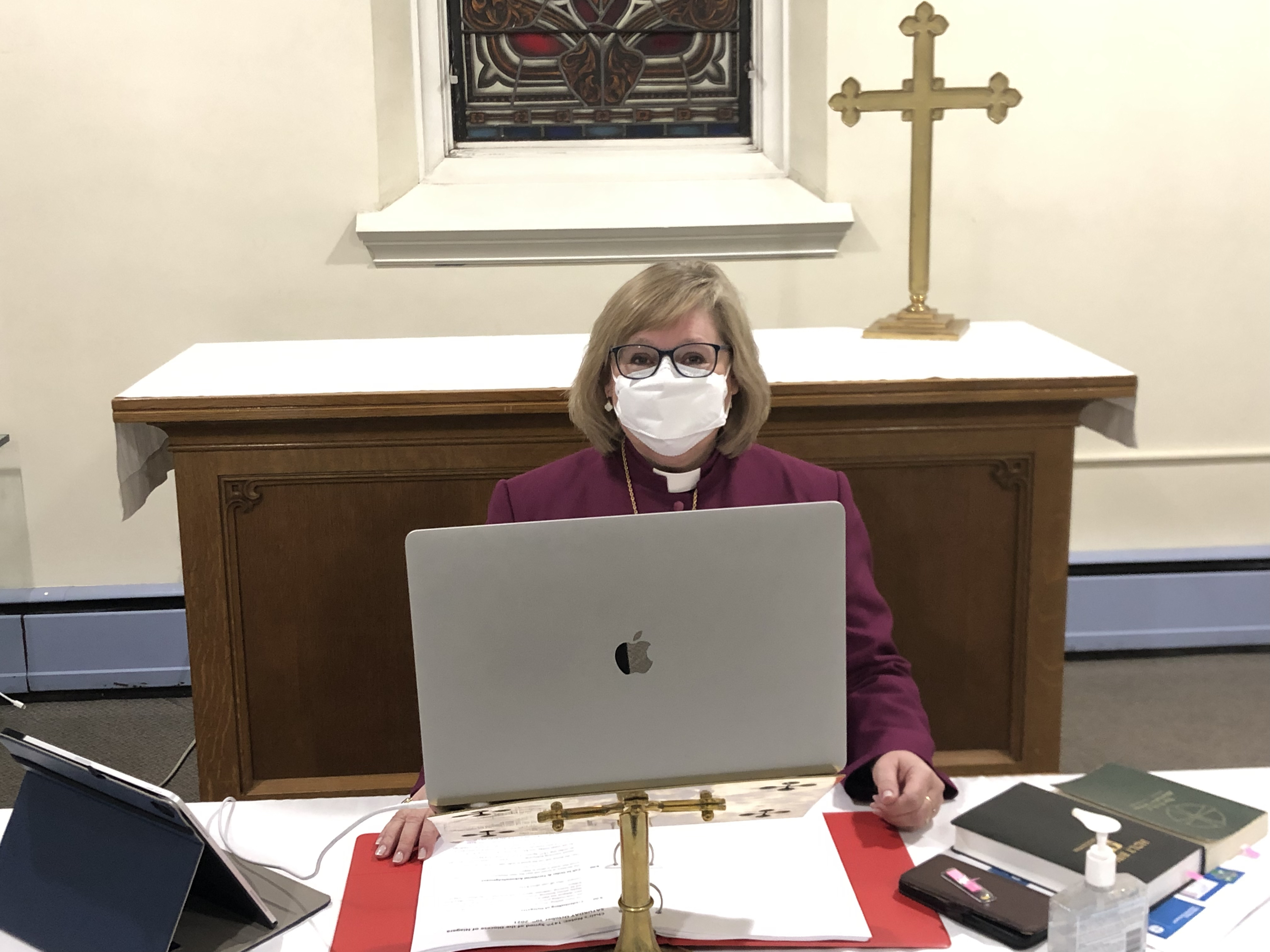Bishop Susan Bell invited members of the 147th Synod of the Diocese of Niagara to “lean into God’s provision and protection with joy,” in response to the Apostle Paul’s call in Philippians 4:4-9.
This passage inspired the theme of synod, Facing Forward: Called to Life, Compelled to Love. Convened on Saturday, October 30, this was the second diocesan synod to be held via videoconference.

After being called to order by the Bishop, Canon Susan Wilson offered a territorial acknowledgment from the garden at St. Matthew on-the-Plains in Burlington, on the traditional lands of the Haudenosaunee and Anishinaabe. Janice Whiteley harkened synod back to Archdeacon Val Kerr’s words from last year concerning reconciliation. She reminded synod that “What would Jesus do” as a refrain for life can take many forms, but it especially means examining our own hearts with honesty as we move forward with matters of truth and reconciliation.
The Bishop, recalling the voice of God in Isaiah 41:10, the most-searched Bible verse during the pandemic, offered a common refrain throughout synod: “It makes a whole lot of good sense to banish fear with hope that is rooted in God’s love.” The closing of synod book-ended this sentiment with a reading from Luke 12:22-32—do not worry, and do not be afraid!
Bishop’s Charge
Bishop Susan Bell’s charge to synod was organized by guiding members through the theme passage of Philippians 4:4-9, considering the moments and ministries that should lead us toward rejoicing.
Read the full text of the bishop’s charge to members of synod here.
Diocesan Safe Church Policy Presentation

Archdeacon Bill Mous and Chancellor Greg Tweney presented the diocese’s new Safe Church Policy to synod for endorsement. One of the key developments was the implementation of the Anglican Communion Charter for the Safety of People. The new policy enhances the safeguards in place for ministries, and is “intended to support safe spaces for all members of our diocese. It allows us to respond to a wider spectrum of situations that might leave someone feeling unsafe,” Archdeacon Mous explained, including conflict, harassment, discrimination, violence, and abuse. Chancellor Tweney reflected that this direction forward “speaks about our commitment to God, to one another, and ourselves,” and Archdeacon Mous agreed that it helps us “live even more deeply” into our mission in the diocese.
Appointment of Canons
The Bishop, in concert with Dean Tim Dobbin, announced the appointment of three people as honourary canons of Christ’s Church Cathedral: Bahman Kalantari, rector of Church of Our Saviour The Redeemer, Stoney Creek; Sue-Ann Ward, regional dean for Trafalgar, rector of Grace Church, Waterdown; and Greg Tweney, diocesan chancellor.
Missional Moments
Two missional moments were shared with the participants of synod to highlight ministries emerging from the implementation of the diocesan MAP. This year, the Niagara School for Missional Leadership was launched with six courses, and a promotional video was shared highlighting reflections from Bishop Susan Bell and several teacher-practitioners and student-practitioners on the significance and timeliness of such a ministry to engage lay and ordained leaders in theological and pastoral training. Second, a video presented by Archdeacon Jeff Ward reflected on the Mission in Acts ministry, focused on Chinese mission and ministry in Oakville. Through the pandemic, it continues to serve seniors, children, and youth especially, beginning with newcomers to Canada and to the faith, guided by the leadership of Chinese Anglican Missioner Garfield Wu.
Canon Changes
Members of synod considered and approved three amendments to the diocesan canons. The first amendment, to Canon 1.4, adds flexibility with regard to receiving nominations from the floor for the election of delegate to provincial or general synods. By removing this clause, all regulations related to such elections are left in the care of synod council. The second amendment clarifies the text of Canon 2.1 which describes who is entitled to vote at an episcopal election and aligns eligibility with the membership of synod described in Canon 1.1. The third revision was made to bring a canon more in line with current practice with regards to providing insurance coverage for parish ministries and the buildings and property entrusted to their care, and to add some flexibility for synod council to approve functional replacement or demolition-only coverage in specific situations.
Anti-Racism Working Group
Chair Naomi Kabugi shared about the journey of learning about racism and listening to the movement of the Spirit. “Racism work takes different expressions—but as the working group of the Diocese of Niagara has been listening and wrestling, we ask: what is the difference we are trying to bring here? How does anti-racism based on a Christian perspective work?” She highlighted how reflecting on the promises made in baptism can be a lens through which Anglicans can address the racism deeply embedded in Christian culture, calling out the evils of this world and mandating the Church to break down barriers and eradicate systemic and structural racism.
A video presentation included reflections by several members of the Anti-Racism Working Group.

Naomi Kabugi also outlined a “Made in Niagara” anti-racism framework that encourages vulnerability and the development of contextual educational programs for individuals and parishes, updates human resource policies, and ensures the establishment of a “Train the Facilitators” program for leadership development in anti-racist work. The Bishop passionately affirmed these calls, and noted that we must not wound our brethren further.
Canon Christyn Perkons then invited members of synod to reflect on their engagement in anti-racism work through their own baptismal vows and share these thoughts in the Zoom chat, which quickly was overflowing with comments. Delegates reflected on the need to listen and learn, as well as to recognize and acknowledge the racism in their midst in order to confront and respond to it. As Canon Penny Anderson, rector of St. Christopher’s in Burlington stated, “My baptism includes a call to engage in decolonizing the Church.”
Climate Justice Niagara
Sue Carson, chair of the Climate Justice Niagara Committee, shared plans for reducing the amount of greenhouse emissions parishes contribute to the environment. She reflected that the pandemic has increased the number of challenges we face in our parishes, but that contributing to the reversal of climate change is something we can all participate in. Prayer, education, action, and advocacy are key components of the committee’s mandate and will help reduce carbon emissions. Future goals include green auditing and participating in global events to secure the future generations of the world. “We will be showing communities that we care and that we love our planet and stand with those who are already suffering from the effects of climate change.” A motion was passed which mandates Climate Justice Niagara to resource parishes to complete a walk-through energy audit of their church buildings by the end of 2022 as a guide to create a parish plan to reach a greenhouse gas emissions reduction target of at least ten percent by 2024.
Diocesan Budget
Archdeacon Peter Scott, chair the Missional Budget Planning Committee, presented the 2022 diocesan budget. Guiding principles for the committee included the continued support for parishes and moving ahead with the diocesan MAP. “There has been a lot to rejoice about this year,” shared Archdeacon Scott, citing the generosity of parishioners, parish technology grant for parishes enabled online worship across the diocese, and having received stabilizing funds from the Canada Emergency Wage Subsidy (CEWS). Still, he noted that “these are tough times, and this is a budget for these times.”
New initiatives include enhancing our ability to “pastor the pastors,” including the Niagara School for Missional Leadership in the budget, adding funding for differentiated curacies, and supporting the work of the Anti-Racism Working Group. Projected expenses for the year have been kept modest as possible, with a $3.9 million investment in ministry. Revenue has been held to approximately the same as 2020. The sale of property will assist the diocese in reducing the deficit next year and help fund diocesan missional priorities, with a focus on leadership initiatives. The projected operating deficit is $91,700, with a cash shortfall of $169,930 after capital expenses for technology and draws from investments.
Members of synod resoundingly approved the 2022 diocesan budget.
Tenth Sacred Circle
Archdeacon Valerie Kerr reflected on the Tenth Sacred Circle, the national decision-making body for Indigenous Anglicans in Canada. It was the first Sacred Circle held virtually, commencing with the lighting of the Sacred Fire on July 14. First Nations people, Inuit, and Métis gathered online with Archbishop Mark MacDonald to talk about their experiences, hopes for the future, and relationships with the wider Anglican Church of Canada. The theme was “Returning Home: Remembering the Lost.” Participants met in breakout groups to continue drafting a document entitled Our Way of Life that will serve as a constitution and by-laws for the emerging, self-governing Indigenous Church.
Election Results
Members of synod voted electronically for delegates for 2022 General Synod, to be held in Calgary in July. Delegates in the order of clergy include Tim Dobbin, Katherine Morgan, and David Anderson. Delegates in the order of laity include Andrew Clinkard, Jodey Porter, and Susan Little.
Synod also elected the following members to the roles of regional representatives to synod council: Rod McDowell (Brock), Thomas Littlewood (Greater Wellington), Cheryl Barker (Hamilton-Haldimand), Rob Towler (Lincoln), Janice Whiteley, and Winston Tinglin (Trafalgar).
Additionally, synod elected Garfield Wu (clergy), Mary Churchill (lay), and Mary Donkin (lay) as representatives from the Diocese of Niagara to the Corporation of Trinity College, for a two-year term.


Our Treasures and Us: A Time for Reflection